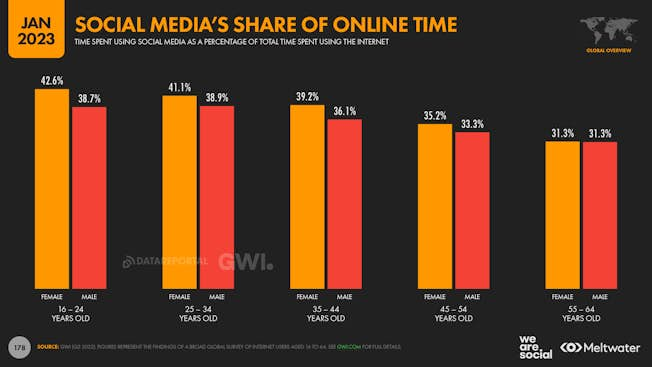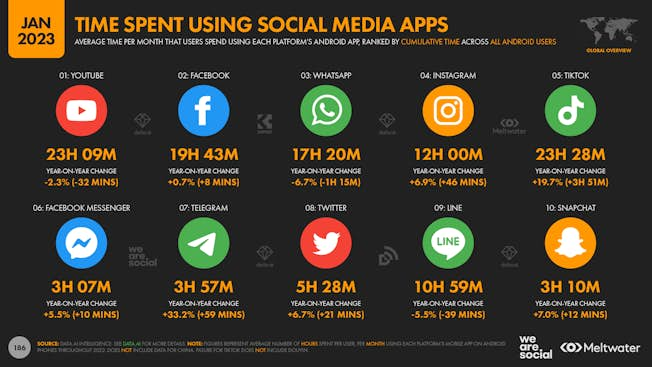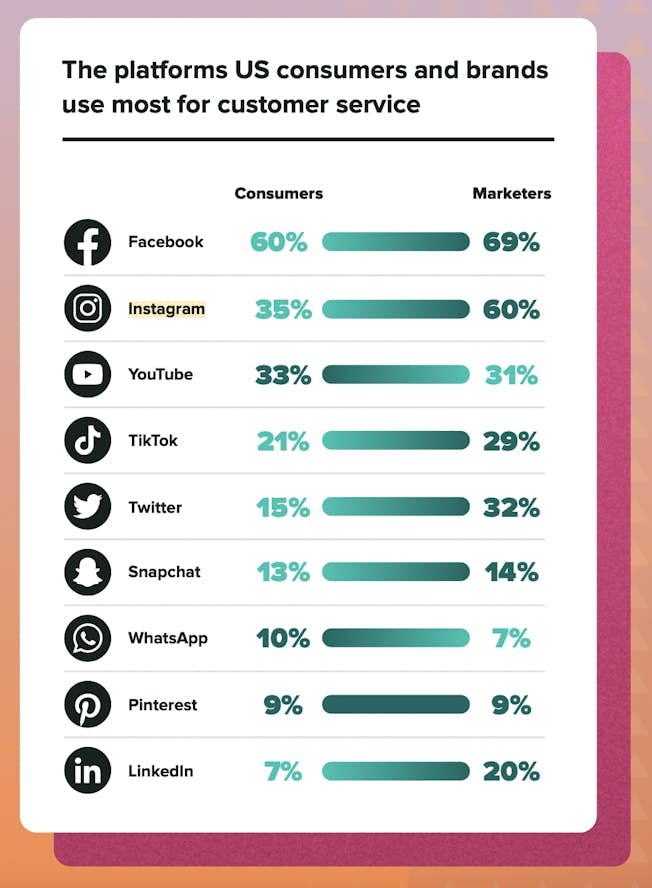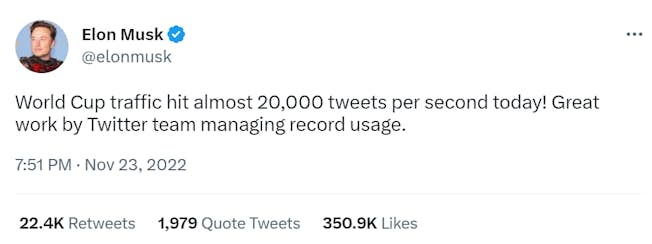Mar 16, 2023
The Cost of Social Media Advertising: Where’s the Value?
If you've ever wished you were a fly on the wall to see what your competitors are up to, here’s a bit of insight: there’s a good chance they’ll be investing more time in social media channels and money in social media ads.
According to Statista, social media advertising spending in the U.S. is expected to reach over $94.4 billion in 2023 and social media spending accounts for $1 in every $3. By 2026, that spend is projected to hit a whopping $122.2 billion.
There’s a good reason for that; the number of social media users keeps rising. By 2027, it's predicted that there will be nearly 6 billion people using social media worldwide.
It's important to understand the value of social media so that you can make the most of the channel to boost leads, drive brand authority and generate revenue.
Who uses social media?
When you consider who’s looking at ads on social media, youth prevails. 84 percent of marketers are targeting Millennials in their social media strategy, followed by Gen X (52%), and Gen Z at 22%. Only 14% of marketers target Baby boomers according to HubSpot.
When it comes to gender, women tend to spend a greater share of their online time using social media platforms, but social’s share decreases with age across all genders according to Digital 2023: Global Overview Report.

Boost engagement on social media
Social media platforms were built for people to engage with each other. It is not so different for your business. Due to its interactive nature, social media is the best channel to build rapport with followers.
You can get very personal by putting faces to names and improving your customer service efforts. Interacting and selling on social through social commerce allows you to make people feel special when you speak directly to them and drive engagement based on feedback or comments. It also provides an excellent opportunity to promote special offers and contests or share news. That can lead to further engagement with new followers.
Of course, it all takes thought and planning to ensure you create great content that's engaging to begin with. Relevant posts, videos, and images will gain positive reactions, which helps encourage engagement as well as sharing.
The graphic below shows that the time spent on social media apps is constantly changing. While Facebook is still the most popular platform, people spend longer on YouTube and TikTok. This is an important thing to consider in your content strategy as video continues to punch above its weight in terms of engagement.

Check out: 'An In-Depth Look at Marketing on TikTok' and '10 Ways to Grow Your YouTube Channel' to get some insights for your social media activities.
Satisfy and respond to your customers
Everything adds to the customer experience. Social media can provide you with a real-time way to answer questions for your customers. It improves relationships by allowing you to reply right away to their comments while creating real connections. This might be a scary prospect, but it is the best way to show you care.
By 2025, 80 percent of customer service organizations will have abandoned native mobile apps in favor of messaging for a better customer experience according to Gartner. This means that apps like WhatsApp, WeChat, and Facebook Messenger will become more popular as a way for customers to interact with brands.
The research also predicts that proactive customer engagement interactions will outnumber reactive customer engagement interactions by 2025. This means that companies will need to anticipate buyers' needs so they provide a solution rather than being contacted.
Social media will also enable you to counteract negative occurrences such as the need for a product recall or respond directly to negative press. It allows you to be proactive, so people know you are aware of issues and are acting on them quickly. Check out our 'Guide to Social Media Crises' for more guidance in this area.
Be aware that social media can also become a venting channel for unhappy customers. However, if you have people venting about an issue with your brand on social media you have a chance to publicly reply to make things better. This method is always preferred from a customer service point of view.
Build Brand Awareness Across Accounts
Brand awareness is always important for your online presence. Consider that 76 percent of people say user-generated content impacts their purchasing decisions and is 9.8 times more impactful than influencer content reported Stackla.
The reason is that people trust other people and reviews, testimonials or recommendations can help build trust and influence purchasing. Social media allows your brand to be brought into the light in an honest way, with real people standing behind your product and stating they love it.
Read: '4 Great Examples of User-Generated Content' for inspiration.
Let's look at the biggest social media platforms to see how to use them to build awareness and drive engagement.
According to Insider Intelligence, 41.5 percent of Meta's revenue will come from Instagram in 2023 and its ad revenues are growing faster than Facebook. With over 1.3 billion users worldwide, it's definitely a platform to have a presence on.
People primarily use Instagram to post or share videos and images which makes it a go-to for engaging young audiences. Over a third of people also use the platform for customer service, making it the second most popular platform after Facebook reports Sprout Media's index.

With a range of interesting and engaging video formats, Instagram offers businesses a great way to not only share branded content but also use influencer marketing and UGC. It's not only about driving engagement but also building a community.
Did you know that 89 percent of shoppers use Twitter to discover new products while over two-thirds agree that conversations on the platform have driven them to purchase?
It's the real-time nature of Twitter that attracts people as it allows for conversations that can happen within minutes rather than days. This makes it great for events or social issues or topics that capture the attention of the world. During the World Cup in Qatar, Elon Musk reported 20,000 tweets per second. That gives new meaning to going viral!
Twitter is also known for its hashtags which can trend and present an opportunity for brands to tap into hashtags and join a conversation. Be sure that what you're linking to and posting is relevant though. Customers will be put off by a tweet for tweeting's sake.

Snapchat
Some companies might overlook Snapchat as a potential advertising channel, yet according to the company's quarterly results, daily active users have increased by 17 percent year-over-year to 375 million.
While you can view Snapchat photos and videos on mute, according to company data 64 percent of users view ads on Snapchat with the sound on while 200 million users also engage with AR. Brands are seeing success using shoppable Lenses allowing people to virtually try out products before purchasing.
If you are not convinced social media is a must because your customer base is B2B, LinkedIn can come to the rescue.
According to the platform, brands have seen a 33% percent increase in purchase intent from ad exposure on LinkedIn while audiences exposed to brand and acquisition messages on LinkedIn are 6 times more likely to convert.
LinkedIn also presents the opportunity to network with people that work in your industry or have a niche product or service. This can be done by joining relevant groups where you can share information that can result in new business or make connections with people in your sector to go into partnership or share insights.
Video content has also become more popular on the platform both organically and for paid ads. So look at what you can repurpose or develop videos from scratch that will resonate with your target audience.
Read: '7 Easy Steps to LinkedIn Success' to find out more about how to be successful.
YouTube
YouTube was created specifically for sharing videos. 59 percent of people state that YouTube ads are more relevant than those on linear TV or other streaming apps according to a Google study. Respondents also ranked YouTube as the number one video service and social media platform to find honest and detailed information.
The introduction of YouTube Shorts has also created new opportunities for brands with this format getting up to 30 billion views a day! You can create 60-second, vertical videos with just a phone and create shoppable ads to drive conversions.
How-to and tutorial videos are also popular on the platform so if you take the time to explain a service or explain how a product is used, it may be a good way to communicate with prospects.
TikTok
TikTok's ads have the potential to reach over 1 billion people with 39 percent of its audience between 18-24 years of age. As one of the fastest-growing social apps (ranking the 6th most popular despite being only 7 years old), its videos are hugely popular with the potential to go viral.
A crucial element of TikTok is its creators or influencers. Those at the top end of the scale can earn millions of likes and thousands of dollars per video but the opportunity for brands is at the nano or micro-level where they can partner with niche creators that have sway in their industry.
Challenges are also huge on TikTok and a hashtag can help to spread the word about an initiative or campaign to millions of people. You can start a branded hashtag challenge to tap into this unique feature.
Nissan Australia saw success with a branded hashtag by inviting people to compete to be a voiceover in their ads. The #improvisewithJUKE campaign was launched with a premium TopView placement in the For You feed when users opened the app. The results were 129 million views globally and a 93 percent lift in brand awareness.
Drive brand authority with social media
Authority is different from brand awareness. To establish your business as an expert in your industry, you have to build brand authority. Posting on social media with relevant, educational, and authoritative information is the best way to show people that you know your stuff.
It nurtures a positive image while offering a forum where customers and visitors can interact. That is especially important for answering questions and being responsive to both increase and demonstrate customer satisfaction.
Brand authority helps generate brand loyalty. In turn, it can provide free advertising for your business as people comment and like what you have to say or offer. This public interaction with customers shows you genuinely care about them and are customer focused. You also encourage customers to be more vocal and to help raise your profile in the minds of new followers.
Becoming an authority on social media can also lead to collaborations. That includes influencers such as fashionistas talking about your creative, trendy T-shirts on their posts, for example. This mutual fan club provides further exposure and seals the deal for your authority.
Social gives your SEO a bump
Social media is an important tool to improve your SEO. You can use your best existing content and incorporate it into your social media posts, giving you more bang for your buck.
Social media can influence bounce rates, provide more inbound links, and increase the time spent on pages; all of which search engines love. Ultimately, it helps get your content shared and liked. As you share more, you will also gain more brand authority and improve your reputation. All of these things work together to convince search engines that searchers have found your content worthy of review, which will bring you up in the rankings.
The sharing aspect of social media also contributes to link-building and can attract influencers. Backlinks are about quality, not quantity so if a well-known content creator shares it, that boosts your SEO value.
Through social media channels, you can raise brand awareness, which increases brand-based searches. These types of searches rank higher than non-branded ones because your name is a keyword in the search.
Social media helps you sell
If none of these facts have you convinced, consider it more in dollars and cents. According to Statista, the social media advertising market is the second biggest market in digital advertising. The worldwide revenue of $226 billion in 2022 is expected to grow to $385 billion in 2027.
The fact is, companies would not invest this much in an advertising method that was not providing them with results. It not only helps boost the bottom line (sales and revenue) but it boosts brand awareness, drives engagement, and helps provide customers with a channel to reach out and get feedback or solutions.
Whichever social media network you choose to use, it's about understanding the audience, creating content that resonates, and being present and active. Value social media and you are bound to see results.
Become a social media maestro!
As social media continues to evolve, it's important to know where to concentrate your efforts as a marketer. DMI's social media course will teach you about social research, social commerce and social strategy while also exploring the ins and outs of the biggest social apps on the market from Facebook to LinkedIn to TikTok. Enroll today to start your social media journey.
Related
Upgrade to Power Membership to continue
your access to thousands of articles, toolkits, podcasts, lessons and much much more.
Become a Power Member- Login
- View Courses
- - - -
- Courses
- Resources
- - - -
- My Account
- Change Password
- Logout




